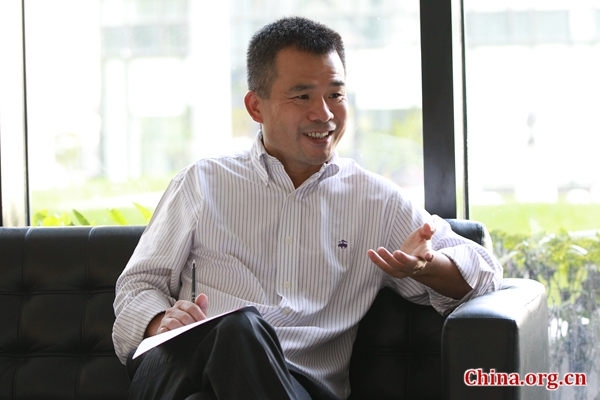G20: A coordination platform for long-term development
Heavyweights from some of the world's key economies will gather together in China's eastern city of Hangzhou for the upcoming G20 summit to discuss how to bring synergy into the most complicated issues facing the world.
Comprised of the world's strongest economies and founded as an alternative to the more exclusive G7, the Group of 20 accounts for about 85 percent of the world's economy and 80 percent of its trade, making it a multilateral dialogue mechanism platform to promote cooperation and tackle challenges.
China and G20 members are ready to strengthen "policy-level coordination" toward balanced and sustainable growth in global business, said Yi Gang, vice-governor of the People's Bank of China, in the run-up to the G20 Leaders Summit on Sunday and Monday.
|
|
| Professor Zheng Xinye, deputy dean of the School of Economics at Renmin University of China and senior researcher at Pangoal Institution, a Beijing-based public policy research think tank [Photo provided to China.org.cn] |
A coordination platform
"The G20, in my opinion, is essentially a global coordination organization that aims to meet the varied pursuits of the current international community," said Professor Zheng Xinye, deputy dean of the School of Economics at Renmin University of China.
Unlike other multilateral mechanisms, like the United Nations, World Bank, the International Monetary Fund (IMF) and the G7 and G8, the G20 is influential, inclusive and easily allows coordination among its member countries, he explained.
Embracing the five permanent members of the UN Security Council, the world's five largest economies, the world's five most populous countries and the five major emerging markets (BRICS), the G20 is growing in stature and deals with various interests affecting most of the world economies.
"Still, as it's less expansive than organizations like the UN, the costs for negotiation and coordination can be significantly cut by a dialogue between the most representative countries in the world," said Zheng, who is also a senior research fellow at the Pangoal Institution, a Beijing-based public policy research think tank.
The more specialized events, like the Sherpa Meetings, Working Group Meetings, the Finance Ministers and the Central Bank Governor's Meetings, held ahead of the annual "big event" will also be an important part of the summit, enabling world leaders to discuss and tackle the most important issues facing the international community, he added.
Eyeing longer-term development goals
Faced with an increasingly integrated world, countries are no longer living on isolated islands, preoccupied with their own issues.
In the past, the G7 and G8 were mainly for coordinating monetary, fiscal and exchange policies between members for short-term woes like economic turmoil, inflation and unemployment, said Zheng.
"However, long-term problems like sluggish economic recovery, unbalanced regional growth, investment and trade protectionism, climate change and environmental degradation call for a collective effort from the world as a whole and a proper mechanism like the G20 to respond and act," he explained.
As outlined in the 13th Five Year Plan, President Xi Jinping has called for supporting measures to implement China's new innovative, coordinated, green, open and shared development model, known as the Five Development Concepts.
The theme for this Hangzhou summit, "towards an innovative, invigorated, interconnected and inclusive world economy," is consistent with the five concepts, under which China is expected to share its own vision and wisdom for global problems, Zheng told China.org.cn.
"Looking back on recent history, China, as an open economy, has been quite skillful in securing fast growth, managing economic turmoil, relieving poverty and bridging regional gaps, which both developed and developing countries are keen to learn from," Zheng argued.
However, in light of the various interests, development paths and priorities of different countries, the veteran economist is cautiously optimistic for the immediate fruits of the upcoming event.
Success does not come overnight; it will take a long time to set new goals and meet them, he said.









Go to Forum >>0 Comments